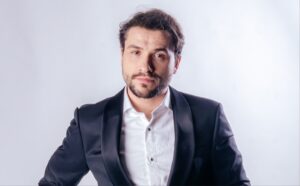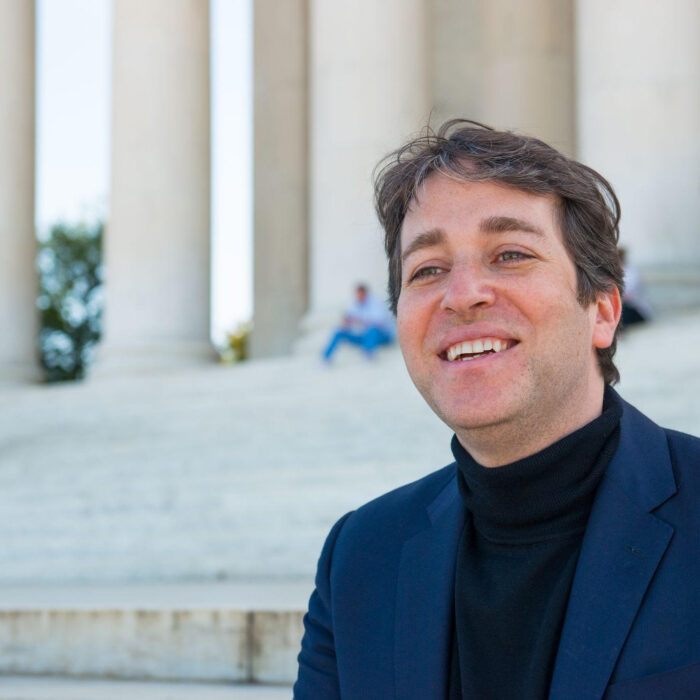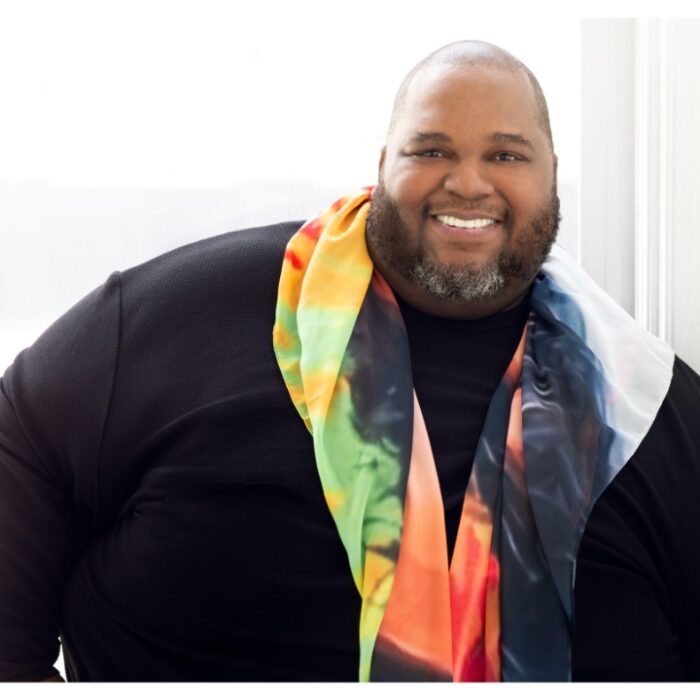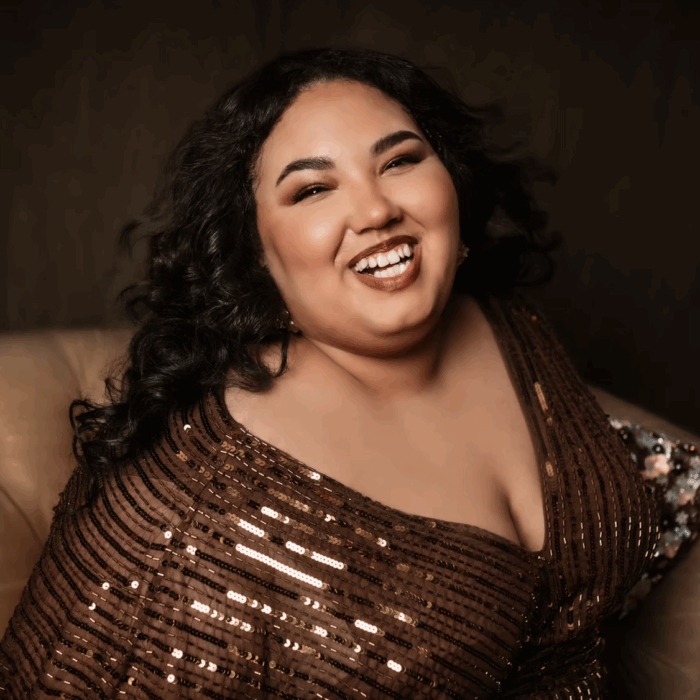
Q & A: Dave Monaco on How a Singer’s Voice Decides for Them, Not the Other Way Around
By Mike Hardy(Photo: © Riccardo Sammartini)
Dave Monaco is not yet 30, but has already been hailed as a “tenor with exquisite natural vocality but impetuous elegance.” He is one of the most talented singers of the bel canto repertoire, particularly valued for his interpretations of Rossini’s work.
Monaco has made a name for himself as a true virtuoso in the world of classical music thanks to his proficiency at the piano and deep knowledge of the complexities of classical composition.
OperaWire caught up with Dave at his home in Italy, via online video.
OperaWire: Buona sera, Dave. Thank you for speaking with OperaWire.
Dave Monaco: Buona sera! I’m a little nervous because this is my first interview in English…
OW: Dave, you’re from Sicily with a distinctive English name!
DM: Haha, yes. My father loved Dave Grusin, a famous jazz pianist, and my brother loved Dave Mustaine, the guitarist from Metallica. They were both convinced I’d grow up to be an artist: my father thought I’d be a pianist, but I ended up a singer instead.
OW: And with the name Monaco, I assume some make mention of Mario del Monaco?
DM: It’s funny, actually, because my father’s name is Mario Monaco and they were born the same day, 27th July.
OW: Well, surely you were destined to become a tenor, then. You’ve just taken part in the Rossini Opera Festival. How did that go?
DM: It went very well. I was honored to take part in the festival with the beautiful cantatas ‘Il Pianto delle Muse sulla Morte di Orfeo’ and ‘Il Pianto delle Muse sulla Morte di Lord Byron,’ both composed by Rossini. The first was written when he was very young and the second much later in his life, so they’re completely different in style and spirit. One of the challenges was simply remembering the titles, they’re quite long!
I was also honoured to perform these works in their new critical edition and it felt especially meaningful knowing that the last time they were performed in Pesaro they were sung by none other than Juan Diego Flórez and Rockwell Blake. I was definitely nervous, but it went well, we received great reviews and are all very happy with the result.
OW: Your musical journey started with you singing pop music, I believe?
DM: It did. I actually started out singing pop music because in my family—at home—no one listened to opera. Especially in my hometown of Palazzolo Acreide, near Syracuse, there isn’t really any operatic tradition, but there is a strong tradition of drama, of Greek tragedy. I like to say I grew up with the tragedy of Syracuse, so, in some way, my first love has always been the theatre.
OW: So when did opera come into your life?
DM: It all started in Syracuse with my first teacher, Giovanna Collica, who told me: “You’re a very good pop singer, but you need to learn how to sing and to do that you have to study the right way to sing, which is opera.” She explained that learning opera is like classical ballet for dancers: it gives you the foundation and technique to do everything else. Once you master that, you can explore other genres. So I started studying opera and was instantly smitten! The first time I sang ‘La donna è mobile, I didn’t know much about it. I thought: what is this ‘La donna è mobile?’ It just seemed like a song, not really musical theatre, but then the choir master asked if I’d consider singing in the lyric choir. I thought, why not? It pays, so that’s good! And so, at just 16, I debuted in an opera as part of the chorus in “Nabucco,” in Trapani. Giovanna Collica then introduced me to more repertoire and helped me discover beautiful arias like Bellini’s ‘Bella Nice, che d’amore’ and ‘Vanne, o rosa fortunata.’ It was with those arias that I truly fell in love with opera. And that’s how my journey began.
OW: Whose voice did you find most inspirational?
DM: When it comes to my repertoire, definitely Luigi Alva. I think his way is the right way to sing Rossini. I also adore Juan Diego Flórez and Rockwell Blake! But, if I had to pick just one, my greatest inspiration remains Alva because he had it all: vocal register, falsetto, filati…
OW: And, of course, you’re known as a bel canto artist yourself. Is that by choice or are you singing bel canto because you want to develop the voice to sing other repertoire?
DM: Definitely a choice. I realized something wasn’t working after singing roles in works like “Traviata” and “Rigoletto.” My voice simply didn’t suit that repertoire, which requires a larger tenor instrument with a stronger middle register. My teacher, the great bel canto tenor Salvatore Fisichella (who, incredibly, still sings beautifully and better than me at 83!) told me: “You have to sing what’s right for your voice.” For me, that meant going back to Rossini. Both Fisichella and my vocal coach, Renata Nemola, always said I was a natural fit: the coloratura, the weight of voice — it was all there. So I rebuilt my career with Rossini and now I’m expanding to other bel canto works: next year I’ll sing Donizetti’s “Enrico di Borgogna” as well as another Donizetti opera I can’t yet reveal. It was a deliberate decision to return to bel canto, because staying within the right repertoire makes a career last. As my teacher likes to say: “Your voice will decide.” If you start with Rossini, Donizetti or Bellini, you need real technique, without it you simply can’t sing that music. With Verdi, Puccini or Romantic repertoire, it’s easier to rely on acting or vocal heft even if the technique isn’t completely solid, though this often shortens a career. But that’s just my opinion. I learned to sing through roles like Don Narciso (“Il turco in Italia”), Conte di Almaviva (“Il barbiere di Siviglia”), Ernesto (“Don Pasquale”), Nemorino (“L’elisir d’amore”), from there, the voice naturally revealed whether it could move in another direction. The biggest mistake a singer can make is changing repertoire purely for “marketing.” When I think of singers like Antonino Siragusa, a friend and a fantastic artist, who always stayed true to Rossini, Bellini and Donizetti, I truly understand what my teacher meant: it’s the voice that decides for you, not the other way around.
OW: Has your voice decided where to go next? What would your dream role be?
DM: Arnold in “Guillaume Tell.” For me, being able to sing this role would mean having solid technique. One of the greatest Arnolds of the past was my teacher, Salvatore Fisichella, who had extraordinary breath control. He always tells me that one day, when I’m older, I will perform it, but only if I have complete control of my technique. That’s something I always keep in mind. So this is my dream role because it would be the ultimate test of my technique, the ultimate test of myself.



